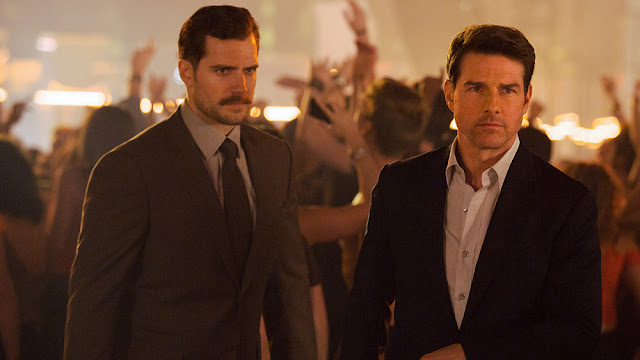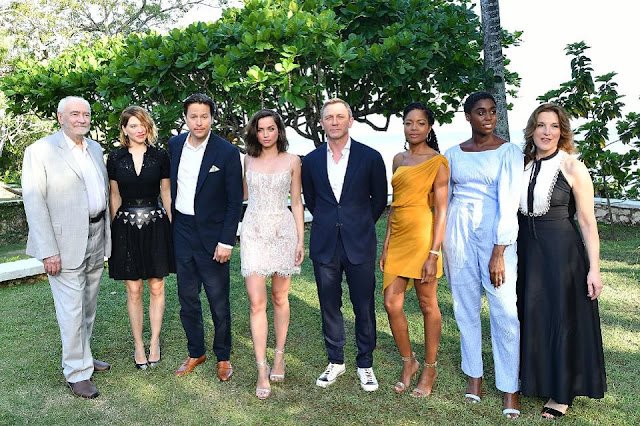Why 'Mission: Impossible - Fallout' Became The Franchises' Highest Grossing Movie
Cruise's on-set accident, Justice League VFX controversies, the insight of it's director and internet-friendly stunts all helped make Fallout the series' highest grossing film
 |
| Henry Cavill and Tom Cruise in 'Mission: Impossible - Fallout' (CREDIT: Paramount) |
by Jack Linsdell
In July 2018, Paramount released their much-anticipated blockbuster sequel Mission: Impossible - Fallout into theatres across the world. The sixth installment in Tom Cruise's long-running and much-loved action franchise debuted in theatres with rave reviews, red hot "buzz" and much publicity. This gave Fallout an impressive $61.2 million opening weekend (Cruise's second-highest ever), before legging out over the summer to a franchise-high domestic total of $220 million. This was higher than it's predecessor, Mission: Impossible - Rogue Nation ($55 million/$195 million) in 2015. Fallout also earned $571 million internationally, on it's way to a whopping $794 million worldwide cume, once again besting Rogue Nation ($487 million/$682 million). That also made the 2018 sequel the highest-grossing film in the franchise too, surpassing Mission: Impossible - Ghost Protocol ($209 million domestic/$694 million global) in 2011. So, why did Fallout achieve such a feat?
Before Brad Bird's Ghost Protocol, the Mission movies were just that - movies. The first three films, however good (Mission Impossible and M:I 3) or bad (Mission Impossible 2), were explicitly stand-alone action flicks. The John Woo and JJ Abrams sequels had no connection to each other or Brian de Palma's 1996 original in any way, making Mission a brand rather than a series. That's why those films had a ceiling of "only" $550 million worldwide. When Ghost Protocol came along, it turned Mission Impossible from "a bunch of mid-budgeted action flicks based around Tom Cruises' stardom" to an interconnected, popular action blockbuster franchise. The 2011 flick was the series' first true sequel, with a plot picking up from the events of M:I 3 involving Ethan Hunt's wife Julia Meade (Michelle Monaghan), with Monaghan making a cameo appearance and becoming the first recurring character outside of Ethan's "team". It also established a narrative sophistication, a broader level of fantastical escapism, a lighter tone and a signature "in camera" stunt/set piece that would become the hallmarks of the series as we know it today. Cue, a worldwide gross of $694 million too.
Since then, both Christopher McQuarrie's Rogue Nation and Fallout have acted as direct sequels to the Brad Bird flick, forming a loose trilogy of sorts. Fallout was the proverbial "part three" installment to the revised Mission series, and likes of The Bourne Ultimatum and The Dark Knight Rises prove that the third film in a trilogy is often the highest grossing one. Combine that with Monaghan reprising her role as Julia (albeit a bigger part this time), and popular characters from Rogue Nation returning like Solomon Lane (Sean Harris) and Isla Faust (Rebecca Ferguson), made Fallout the film that "linked" the Mission series together. I'm not saying it was the Avengers: Endgame to Mission but you get the idea.
Fallout also benefited greatly from a series of high profile on-set incidents and production problems that became very media friendly click-bait stories, driving publicity. First, Cruise breaking his ankle when performing a rooftop jump stunt made instant headlines around the world when it forced production to shut down for several weeks while he recovered. This inspired popular videos of the specific moment in the London foot chase sequence where he broke his ankle (as the shot was left in the final cut) to emerge online. I'm sure there were some who saw the film solely for the moment in the film when "it" happened. Also, the VFX controversies with Justice League also helped put Fallout into the public's attention. Henry Cavill grew a moustache for his role in the film after he'd finished filming Justice League. However, when that DC comics flick started those infamous reshoots under Josh Whedon, Warner Bros. asked Cavill to shave it off despite his work on Fallout being far from complete. Look, I'm not saying these two "internet friendly" production controversies are the reason loads more folks saw Fallout in theatres than other Mission movies, but it sure as hell didn't harm.
Also, we have to give credit to the skill, craftsmanship and insight of writer/director Christopher McQuarrie. Yes, Fallout is the "best made" (from an artistic POV) movie in the franchise, which sure helped when it came to the positive word-of-mouth that spread for the flick. McQuarrie is one of the best filmmakers in the business and a truly underappreciated talent. However, it was McQuarrie's insight to undertake certain choices that are key to Fallout's success. McQuarrie adhered to the franchises' unwritten rule of a new director everytime when he returned after Rogue Nation, giving Fallout a refreshing "look and feel". His choice to make a darker and more emotional movie (his words) targeted the young teenage demographic, who were skipping theatres to watch the likes of Game of Thrones and Black Mirror via streaming at home. It also "validated" the franchise to those who thought it was too unbelievable or fantastical. This grew the audience appeal of Fallout beyond the fans, successfully growing the Mission brand. McQuarrie's insights into the industry and audience trends, and then his artistic decisions to support these findings, helped make Fallout a better made movie that appealed to more people.
We also can't not mention the significance of added value elements like Henry Cavill, whose somewhat popularity as a sex symbol and being the Man of Steel in the DC Universe (plus leading Netflix's The Whitcher series), also gave Fallout another attraction. Seeing Tom Cruise face off against Henry Cavill, or Ethan Hunt against Clark Kent, probably formed part of the attraction for everday folks to see the movie in theatres. Not to forget Cavill uncharacteristically playing a bad guy for once too.
Finally, both Ghost Protocol and Rogue Nation gained the Mission series a newfound identity and popularity when they featured Cruise performing a signature "in camera" stunt. Be it scaling the Burj Khalifa skyscraper in Ghost Protocol or hanging for real off the side of an airplane as it takes off, Cruise has become the definition of "cool" by performing such ambitious and awe-inspiring stunts, turning the Mission movies into unique event movies. Fallout had three movies worth of stunts rolled into one. These included Cruise performing a real halo jump all in one take, Cruise flying a helicopter for real all by himself, Cruise climbing up and falling off a helicopter payload all for real and Cruise riding a motorbike without a helmet into oncoming traffic in Paris all "in camera". All these made Fallout the real deal compared to it's blockbuster competition which rely heavily on CGI to create their action scenes. Fallout was almost the epitome of Cruise's "guy who looks cool doing crazy stunts" mantra, something which he's continuing with Top Gun Maverick and Mission Impossible 7.
So, there are many reasons why Fallout clicked this time two years ago with both general audiences and fans. The artistic decisions and insights of it's director, not only made Fallout the best film yet in the series, but also successfully expanded its audience appeal to demographics (like teenagers) who rarely see movies in theatres anymore. And, Fallout also become the beneficiary of all the goodwill and popularity gained by the last two installments that arguably turned the series into a blockbuster franchise in the first place. Bringing back characters and plot threads from those movies didn't harm either.
However, unplanned controversies and onset incidents that occurred during production also gave Paramount loads of free publicity for the film, which if not a reason for people to see the movie, certainly helped in promoting Fallout to the public and generating overall interest in it. As a big fan of the franchise, Fallout, Cruise and McQuarrie, I can't wait for the next two movies (currently shooting). But, if lessons are to be learned for this flick's success, it's that sometimes it's the things that you can't control that have just as much impact as those that you can.


Comments
Post a Comment